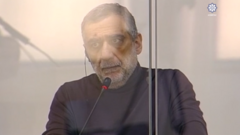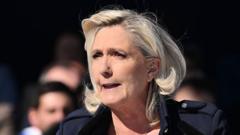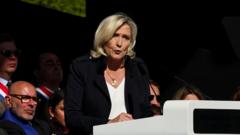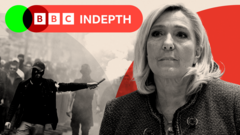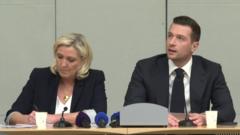In a significant legal challenge, Prosecutor Nicolas Barret has requested a five-year prison term and an immediate political ban for Marine Le Pen, leader of the far-right National Rally, linked to an illegal party funding scheme. Le Pen, who denies the charges, claims this is an attack on democracy.
Marine Le Pen Faces Potential Prison and Political Exile Over Alleged Funding Misconduct

Marine Le Pen Faces Potential Prison and Political Exile Over Alleged Funding Misconduct
The Paris prosecutor demands a five-year prison sentence and political ban for Marine Le Pen amid illegal funding charges, intensifying political tensions in France.
The Paris prosecutor has initiated a rigorous legal battle against Marine Le Pen, the prominent leader of France's far-right National Rally (RN), seeking a significant prison sentence along with a prohibitive political ban. Prosecutor Nicolas Barret has called for a five-year jail term and a five-year disqualification from holding political office for Le Pen due to allegations surrounding illegal party funding practices.
This case revolves around accusations that Le Pen and over 20 other senior party figures employed staff ostensibly as assistants funded by the European Parliament, who instead worked directly for the party. The prosecutor's demands, if granted, would bar Le Pen from competing in future elections, specifically impacting her potential candidacy for the presidency in 2027, regardless of any appeals her defense may file.
In a press briefing post-hearing, Le Pen denounced the prosecution's stance as an "outrage," alleging that the legal actions are a deliberate effort to incapacitate her National Rally and deprive French citizens of their voting rights. Despite her defeat against Emmanuel Macron in the last presidential election, the RN remains the largest party in France's National Assembly.
In addition to the potential prison sentence, the prosecution is advocating for a hefty fine of €300,000 against Le Pen, positing that while there exists a provision for the sentence to be "convertible," the immediate effect of the political ban would severely limit her participation in future political discourse. Barret has made clear that this ban should encompass all 25 defendants involved in these proceedings, emphasizing the equal application of the law.
The core of the prosecution's argument alleges that Le Pen maintained a system for years wherein RN personnel, positioned in Paris, were improperly validated as EU parliamentary staff while their contributions were largely non-existent in actual parliamentary roles. The defense, however, contends that all parliamentary assistants naturally lean towards political engagements, thus blurring the lines between party work and parliamentary obligations.
Jordan Bardella, RN's chairman, also expressed indignation over the prosecution's moves, characterizing it as an unjustified attack on democracy. A representative for the European Parliament remarked on the methodical consistency of the prosecutor's case. The trial is slated to extend through November 27, with continued scrutiny on the implications of these charges for Le Pen and the broader French political landscape.





